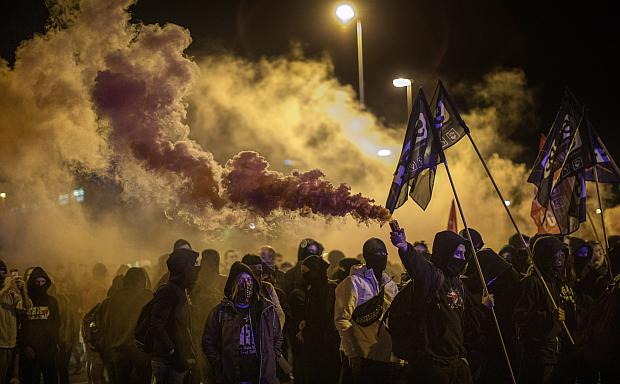
Pro-independence demonstrators, some of them holding flares, march as they take part in a demonstration in Girona, Spain, Tuesday Oct. 1, 2019. A few hundred Catalan secession supporters are marching in the northeastern city of Girona to mark two years since a banned independence referendum that shook Spanish politics. (Photo by EMILIO MORENATTI / AP)
GIRONA, Spain — A few hundred secession supporters marched early Tuesday in Spain’s northeastern city of Girona to mark two years since a banned independence referendum that shook Spanish politics.
Larger protests were scheduled later in the day amid heightened security measures across the wealthy Catalonia region of 7.5 million people, where separatist sentiment has been on the rise for nearly a decade.
They are being watched by all sides as a sign of the independence movement’s strength and its capacity to keep troublemakers from tarnishing its reputation of peaceful struggle.
The sensitive anniversary comes as Spain’s Supreme Court is set to rule on a rebellion and sedition trial against a dozen Catalan politicians and activists who were key protagonists in Catalonia’s Oct. 1, 2017, independence referendum.
Any ruling that doesn’t absolve the defendants will be considered “unfair,” grassroots pro-secession civil society groups announced Tuesday, calling for protests and “peaceful civil disobedience” if the court rules otherwise.
The arrests last week of seven pro-independence activists who face possible terrorism charges have also angered many in Catalonia, who liken the crackdown to an attempt by Spanish authorities to criminalize their political independence movement.
The activists were linked to the grassroots, self-appointed Committees for the Defense of the Republic, or CDRs, which have called some of Tuesday’s protests.
Although the judicial probe is sealed by Spain’s National Court, which typically has jurisdiction over terrorism-related cases, details of the interrogations of the activists have been leaked to Spanish media.
They largely paint a picture of a secretive, organized group that allegedly prepared explosives to wreak havoc in communications and key infrastructure and planned to occupy the regional Catalan parliament in Barcelona in response to the upcoming Supreme Court’s ruling.
Some of the publications linked the activities of the CDRs to the region’s current and former separatist leaders. Carles Puigdemont, the ousted Catalan president who Spain considers a fugitive, denied any links to the activists during an interview Tuesday with Catalan radio in Belgium, where he fled in 2017 after the failed independence bid.
Puigdemont, who has successfully fought off extradition requests by Spain to Belgian and German authorities, accused Spanish authorities of looking for ammunition to make a fresh attempt to arrest him.
“They are trying to push a narrative to accuse me of terrorism,” he said.
Spanish politicians and editorials have criticized separatist leaders for not condemning the activists’ alleged plans. In a speech Tuesday, Puigdemont’s successor Quim Torra, the current regional president, said his cabinet remained focused on establishing a Catalan Republic “without excuses,” and to do it “democratically and peacefully.”
Spanish Prime Minister Pedro Sánchez, who has been in a caretaker capacity since February and faces a repeated general election next month, delivered a stern warning Tuesday to the separatists. If regional separatist leaders break Spanish laws again, he told Cadena Ser radio, central authorities would not hesitate to suspend the region’s self-government and apply direct rule again, as they did two years ago after the divisive independence attempt.
“That’s why I’m asking separatists not to play with fire, they need to condemn any violent activity,” Sánchez said.
Tuesday’s referendum anniversary protests took place amid a strong police presence, especially in train stations and on highways.
In Girona, some activists threw eggs filled with red paint at riot police and overturned large trash containers. Marchers holding smoke torches shouted “Out with the occupying forces!” at the gates of the city’s Civil Guard barracks, before moving to the Spanish government’s provincial delegation to stage a sit-in.
A bigger demonstration is expected in the evening in Barcelona, departing from a central square and touring some of the schools that were stormed by riot police two years ago when they were turned into polling stations for the illegal vote.
Polls and recent elections show that the 5.5 million voters of Catalonia are roughly evenly split on the independence issue.
/atm